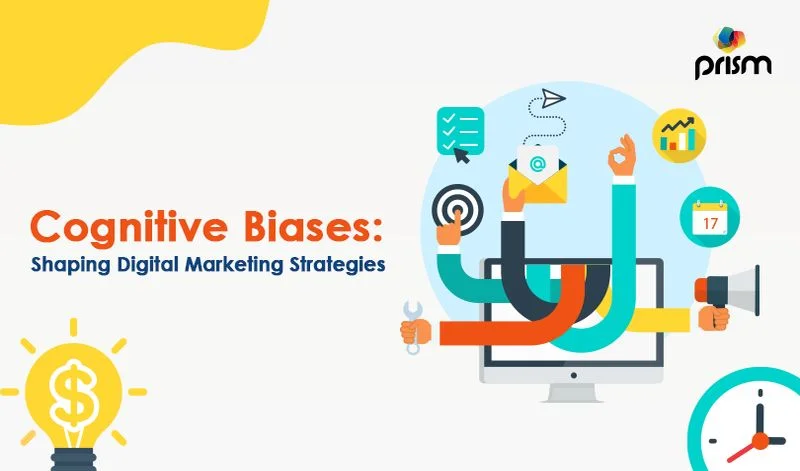

COGNITIVE BIASES: SHAPING DIGITAL MARKETING STRATEGIES

A Brief Overview of Cognitive Biases
Would you believe if we say that our psychological quirks or biases often deviate us from what humans strictly consider rational? Cognitive biases are so deeply ingrained in our psychology that we rarely notice their presence.
Often our brain makes decisions based on shortcuts instead of thorough analysis, and this is why cognitive biases can influence everything from our perception of risk to our memory. They shape everything from how we interpret information and evaluate choices to how we ultimately make decisions. This is why digital marketers should understand the correlation between cognitive psychology and marketing to tap into their audience's mindset and create more persuasive and impactful campaigns that align with how people naturally think and behave.
The Role of Cognitive Biases in Digital Marketing
In case you are wondering how cognitive biases are shaping digital marketing strategies, we have just the information you will need to understand the influence of biases on marketing. Read on to discover how digital marketing services that understand cognitive biases can help in your marketing efforts:
#1 The Anchoring Effect: Establishing a Baseline
Have you ever bought something online or in stores because the price of the item was lower than the actual price? However, while you were making a purchase, did you notice how the brands display the price of the item right next to the discounted price? Well, this is how the anchoring effect works. Anchoring bias in advertising refers to the tendency to depend immensely on the first piece of information or the anchor when consumers make their decisions.
Digital marketing services also apply the anchoring effect on subscription models. Most marketers who understand the principles of human psychology present the most expensive plan of some brands to set a high anchor. Then, they introduced low-tier options (which was supposed to be the original quote) to make the plan more attractive. It’s all about framing the decision, so customers feel like they are getting the value. To understand framing effects in marketing strategies, let’s consider an example. You are presented with two statements about a medical treatment:
- The treatment has a 90% success rate
- The treatment has a 10% failure rate
Although both statements offer the same information, people tend to react more positively to the first statement. This is how biases affect consumer behavior, which is why marketers need to work their way to include them in marketing campaigns to sway customer perception, attitudes, and behavior.
#2 The Scarcity Principle: Creating Urgency
Creating the sense of scarcity is a cognitive bias that triggers the fear of missing out, and leads consumers to make impulse decisions. In fact, for marketers scarcity is a well-known psychological principle that hints people about “the higher value a product has, the more exclusive or limited it is in terms of availability.”
To influence consumer decision-making biases and showcase scarcity in their inventory for certain products, marketers often launch limited-time offers, countdown times, and phrases such as “only a few items left” or “sale ends tonight” on their websites, email marketing campaigns, product pages or even social media ads.
These marketing elements try tapping into a consumer’s desire to avoid loss, so they won’t miss out on a deal, product, or opportunity, for that matter.
#3 The Bandwagon Effect: Using Social Proof
Humans often act as a flock of sheep; they tend to do what others do and adopt certain behaviors, traits, or beliefs because others are doing so. In digital marketing, this principle manifests through social proof. In case you are thinking about what social proof is, let us tell you it can take many forms. From customer reviews and celebrity endorsements to testimonials and user-generated content, social proof can be anything.
For example, if you have ever bought anything just because there were thousands of positive reviews on the product page, or your favorite influencer recommended it, that’s the bandwagon effect in motion. Brands can work with digital marketing services for the bandwagon effect if they want to reduce the perceived risk of a purchase. When potential customers see that others have already bought and enjoyed a product, they are more likely to follow suit, and this is especially effective on platforms like Instagram and YouTube, where influencer marketing dominates.
#4 Confirmation Bias: Reinforcing Existing Beliefs
One of the most effective consumer decision-making biases, confirmation bias occurs when people seek out or interpret information in a way that confirms their pre-existing beliefs. For example, marketers can use third-party data to create custom ads and content recommendations that can lure customers because they align with their previous behavior, interests, and opinions. Platforms like Facebook and Google have mastered this by using algorithms that serve content and ads based on users’ past interactions, ensuring that they see information that reinforces their preferences and decisions.
Conclusion
Every marketer tries their level best to get your product/ service in front of your potential customers. However, only a few who understand marketing psychology insights can actually make an impact in the long term. Emotional triggers in marketing can go a long way if they are played right and if you want cognitive biases to shape your digital marketing blueprint, guide consumer decisions, and influence the effectiveness of your campaigns, ensure to opt for the professionals for the best results.

About The Author: Lovetto Nazareth
Lovetto Nazareth is a digital marketing consultant and agency owner of Prism Digital. He has been in the advertising and digital marketing business for the last 2 decades and has managed thousands of campaigns and generated millions of dollars of new leads. He is an avid adventure sports enthusiast and a singer-songwriter. Follow him on social media on @Lovetto Nazareth
Post Your Comment!
Recent Blogs
GEO, AEO, LLMO vs SEO: New Strategy or Just Old Wine in a New AI Bottle?
Orphan Pages in SEO: Hidden Technical Issues and How to Fix Them
The Dubai Edge: Cross-Channel Funnels Transforming the Game for Digital Success
Programmatic SEO: The Scalable Growth Engine Dubai's Top Agencies Use for Large Websites

Support
Phone: +971 55 850 0095
Email: sales@prism-me.com
Location: Prism Digital Marketing Management LLC Latifa Tower, Office No. 604 - West Wing World Trade Center 1, Sheikh Zayed Road Dubai, UAE
Subscribe
Join our newsletter to stay up to date on features and releases.
By subscribing you agree to our Privacy Policy and provide consent to receive updates from our company.
